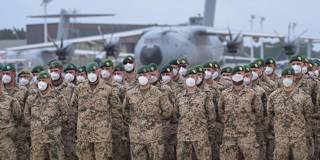The West's disastrous withdrawal from Afghanistan has intensified in Europe a sense of insecurity regarding the future of NATO, and the transatlantic relationship more broadly. But whether anxiety will spur action remains far from certain.
MADRID – There is good reason to be critical of the American withdrawal from Afghanistan. If the images of desperate Afghans flocking to Kabul airport were not harrowing enough, the deadly attack on the gathered crowds certainly should have been. The chaotic and humiliating end to an unpopular war, with its terrible humanitarian consequences, was the upshot of a series of political miscalculations by a succession of American leaders.
In Europe, the rapid collapse of the Western-backed Afghan government has prompted a spate of finger-pointing and accusations. But the return of the Taliban to power has also intensified an already-growing sense of insecurity regarding the future of NATO and the transatlantic relationship more broadly. Whether anxiety will spur action, however, remains far from certain.
For the European Union, geopolitical soul-searching is something of a chronic condition. It generally leads to bold declarations and hopeful visions of strategic autonomy – an idea that has been in the air since the 1990s, but that has gained newfound relevance in recent years.

MADRID – There is good reason to be critical of the American withdrawal from Afghanistan. If the images of desperate Afghans flocking to Kabul airport were not harrowing enough, the deadly attack on the gathered crowds certainly should have been. The chaotic and humiliating end to an unpopular war, with its terrible humanitarian consequences, was the upshot of a series of political miscalculations by a succession of American leaders.
In Europe, the rapid collapse of the Western-backed Afghan government has prompted a spate of finger-pointing and accusations. But the return of the Taliban to power has also intensified an already-growing sense of insecurity regarding the future of NATO and the transatlantic relationship more broadly. Whether anxiety will spur action, however, remains far from certain.
For the European Union, geopolitical soul-searching is something of a chronic condition. It generally leads to bold declarations and hopeful visions of strategic autonomy – an idea that has been in the air since the 1990s, but that has gained newfound relevance in recent years.